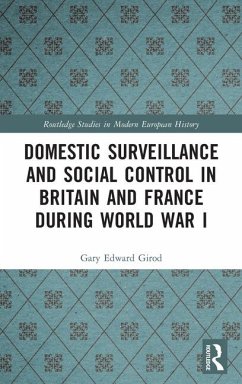Domestic Surveillance and Social Control in Britain and France during World War I examines the rapid development and expansion of agencies and governmental power to monitor and control the homefront in Britain and France during World War I. It documents the rapid shift in focus from the feared but unimportant threat of German espionage toward homegrown radicals. The book utilizes a vast array of documents generated during the war by top-level government committees, intelligence agencies, and police services as it demonstrates the emergence of mass domestic surveillance. Detailing how events and ideas in one country impacted the other, the book argues that Britain and France developed remarkably similar intelligence agencies and policies due to their shared experiences before, during, and after the war.
This book will appeal to students and scholars alike, though its moderate length and chronological approach make it accessible to a wider audience. Additionally, it willfit a number of courses, including studies of the state, intelligence studies, and modern European history courses.
This book will appeal to students and scholars alike, though its moderate length and chronological approach make it accessible to a wider audience. Additionally, it willfit a number of courses, including studies of the state, intelligence studies, and modern European history courses.








